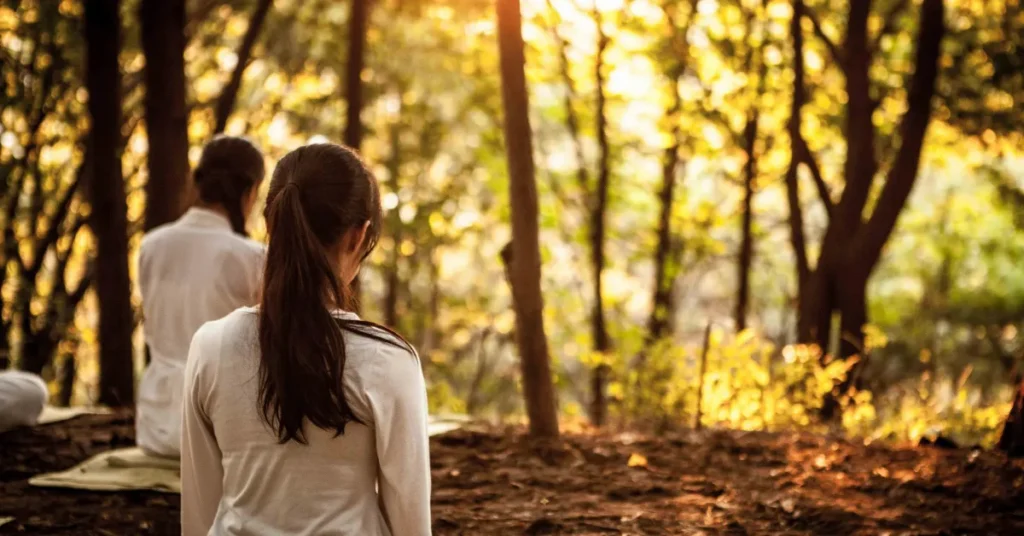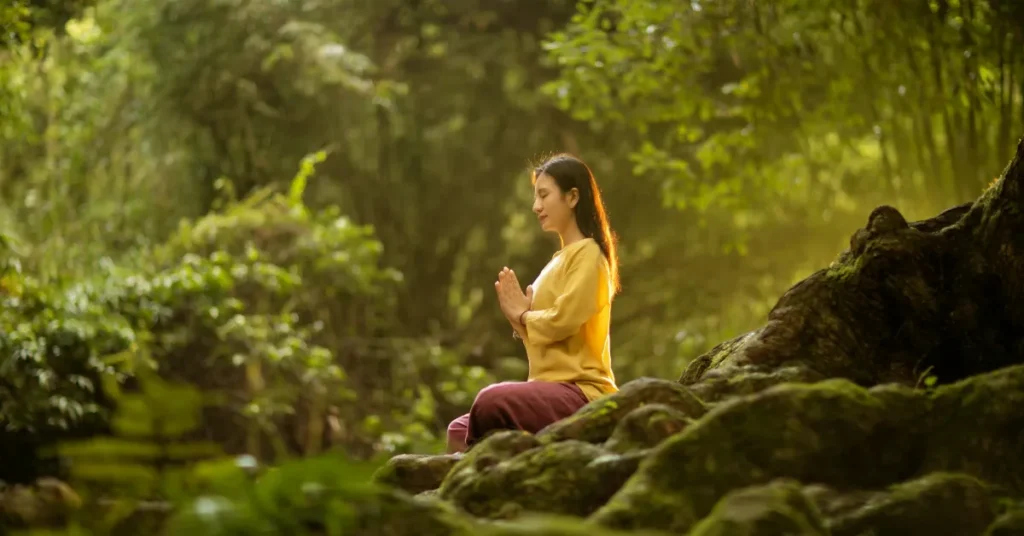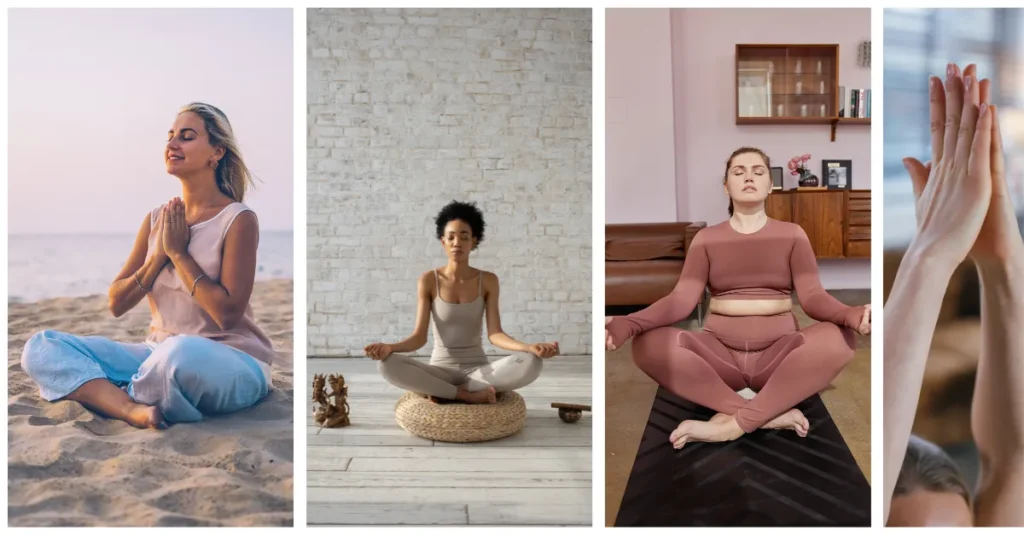Mindfulness Meditation Retreats: A Journey to Inner Peace and Self-Discovery
In our hyperconnected, fast-paced world, the ancient practice of mindfulness meditation has emerged as a powerful antidote to modern stress and mental overwhelm. While daily meditation practice offers tremendous benefits, mindfulness meditation retreats provide an opportunity for deeper transformation—a complete immersion into presence, self-awareness, and inner peace.
In a world simultaneously connected through and plagued by social media, silence is becoming an ever-appreciating commodity. While retreats – spiritual or otherwise – provide an opportunity to unwind and develop helpful habits, the question is, how to bring these calming practices home? Sister True Vow advises keeping the commitment “clear and simple” and finding a supportive community. While I try to practice a short meditation each day, the serenity reboot at places like Blue Cliff and Abbaye de Saint-Benoît-du-Lac keeps me returning for weekend retreats at least once a year.
As we emerged from the Blue Cliff woods post-walking meditation, we passed a calligraphy sign at the entrance of the monastery that read, “I have arrived, I am home”, reminding me once again of Thay’s teaching that our home – our sense of serenity – is in the present moment.
What Is a Mindfulness Meditation Retreat?
A mindfulness meditation retreat is an intentional withdrawal from the distractions of daily life to engage in sustained periods of meditation, contemplation, and mindful living. These retreats create a supportive environment where practitioners can deepen their understanding of mindfulness while experiencing its profound effects on both mind and body.
Unlike typical vacations that focus on external experiences, meditation retreats turn attention inward, offering participants the chance to observe their thoughts, emotions, and sensations with clarity.

The Science-Backed Benefits
Recent research has validated what contemplatives have known for centuries: meditation retreats offer measurable benefits for mental and physical well-being. A study published in JAMA Internal Medicine found that mindfulness meditation programs can significantly reduce anxiety, depression.
Research from 2024 shows that meditation retreats can:
- Reduce stress and anxiety: Participants experience a break from daily stressors, allowing the nervous system to reset and heal
- Enhance emotional resilience: Regular practice develops the ability to observe difficult emotions without being overwhelmed by them
- Improve focus and concentration: Extended periods of meditation strengthen attention and mental clarity
- Promote physical healing: Studies indicate improvements in immune function, blood pressure, and chronic pain management
- Foster self-awareness: The retreat environment facilitates deep self-reflection and personal insight
PMC Research demonstrates that residential meditation retreats offer “a promise of sustainable well-being,” with participants maintaining benefits long after the retreat ends.

Types of Mindfulness Meditation Retreats
1. Silent Retreats
The most traditional form, silent retreats involve maintaining “noble silence” throughout the experience. Participants communicate only when necessary with teachers or staff, allowing for deep introspection without social distractions The Guardian.
2. Vipassana Retreats
Often lasting 10 days, Vipassana retreats focus on insight meditation—observing the nature of reality through deep self-observation. These intensive retreats follow a structured schedule with alternating periods of sitting and walking meditation.
3. Mindful Living Retreats
These retreats integrate meditation with daily activities like eating, walking, and simple tasks, teaching participants how to bring mindfulness into all aspects of life.
4. Nature-Based Retreats
Combining meditation practice with time in natural settings, these retreats use the healing power of nature to enhance the meditative experience.

What to Expect: A Typical Day
Most meditation retreats follow a structured schedule designed to support sustained practice:
Early Morning (5:30-6:00 AM): Wake-up bell and optional yoga or stretching
Morning Meditation (6:00-8:00 AM): Guided sitting meditation
Breakfast (8:00-9:00 AM): Mindful eating in silence
Walking Meditation (9:00-10:00 AM): Slow, deliberate movement practice
Teaching/Dharma Talk (10:00-11:00 AM): Instruction and spiritual guidance
Sitting Meditation (11:00 AM-12:00 PM): Individual practice
Lunch (12:00-1:00 PM): Mindful meal and rest
Rest Period (1:00-3:00 PM): Personal time for reflection or gentle activity
Afternoon Meditation (3:00-5:00 PM): Alternating sitting and walking
Dinner (5:00-6:00 PM): Light evening meal
Evening Meditation (7:00-9:00 PM): Group sitting and closing reflection
Rest (9:00-10:00 PM): Preparation for sleep
Declutter the Mind notes that most retreats begin each day around 6 AM, emphasizing the importance of early rising for mental clarity.
Preparing for Your First Retreat
Mental Preparation
- Set clear intentions: Define what you hope to achieve—stress relief, deeper self-understanding, or spiritual growth
- Start a daily practice: Begin meditating 10-15 minutes daily weeks before your retreat
- Reduce screen time: Gradually decrease digital consumption to ease the transition to retreat life
- Practice mindful eating: Begin paying attention to meals as preparation for retreat dining
Physical Preparation
- Improve flexibility: Engage in yoga or stretching to prepare for extended sitting
- Establish healthy sleep patterns: Most retreats require early rising
- Address health concerns: Consult healthcare providers about any medical conditions
Practical Packing Essentials
According to Eagle Creek’s meditation retreat packing guide:
Clothing: Comfortable, loose-fitting clothes in earth tones; layers for temperature changes; comfortable walking shoes
Meditation Supplies: Cushion or meditation bench (if not provided); blanket for warmth
Personal Items: Journal for insights; minimal toiletries; any necessary medications
What to Leave Behind: Electronic devices, books (unless permitted), elaborate clothing or jewelry.

Choosing the Right Retreat
Location Considerations
- Climate and Setting: Mountain retreats offer solitude, while coastal locations provide ocean sounds for meditation
- Accessibility: Consider travel requirements and physical accessibility needs
- Cultural Context: Some may prefer retreats in Buddhist monasteries, while others choose secular centers
Renowned Retreat Centers Worldwide
According to CNN’s selection of world’s best meditation retreats:
United States:
- Spirit Rock Meditation Center, California
- Insight Meditation Society, Massachusetts
- Art of Living Retreat Center, North Carolina
International:
- Plum Village, France (founded by Thich Nhat Hanh)
- Wonderland Healing Centre, Thailand
- Vipassana centers worldwide through the Goenka tradition
Cost Considerations
Retreat.guru indicates that mindfulness retreats typically cost between $150-350 per day, depending on location, amenities, and program length. Many traditional Vipassana centers operate on donation basis, making them accessible regardless of financial means.
Potential Challenges and How to Navigate Them
Physical Discomfort
Extended sitting can cause leg pain, back aches, and stiffness. Solutions include:
- Using proper cushions and supports
- Alternating positions during meditation
- Gentle stretching between sessions
- Communicating with teachers about modifications
Emotional Intensity
Meditation can bring suppressed emotions to the surface. This is normal and often therapeutic. Sunflower Counseling emphasizes that emotional release is part of the healing process.
Mental Resistance
The mind may rebel against the structure and intensity. Strategies include:
- Remembering your initial intentions
- Focusing on one moment at a time
- Seeking guidance from experienced teachers
- Practicing self-compassion
Long-Term Integration: Bringing Retreat Wisdom Home
The true value of a meditation retreat extends far beyond the retreat itself. Research shows that participants who successfully integrate retreat insights into daily life experience lasting transformation.
Post-Retreat Practices
- Maintain daily meditation: Even 10-15 minutes daily can preserve retreat benefits
- Create mindful routines: Apply mindfulness to everyday activities like eating and walking
- Join meditation communities: Connect with local sanghas or online groups for support
- Plan regular retreats: Many practitioners attend annual or bi-annual retreats for renewal
Career and Relationship Benefits
A rom a legal professional highlights how meditation retreats can enhance professional performance, emotional regulation, and interpersonal relationships.
The 2024 Meditation Movement
The theme for World Meditation Day 2024 was “Inner Peace, Global Harmony,” reflecting growing recognition of meditation’s role in personal and collective well-being Pace Hospital. This global emphasis underscores how individual practice contributes to broader social healing.
Recent neuroscience research from Mount Sinai reveals that meditation creates measurable changes in deep brain areas associated with memory and emotional regulation, providing scientific validation for practitioners’ experiences of transformation Mount Sinai.
Taking the Next Step
For those considering their first mindfulness meditation retreat, the journey begins with a single intention. Whether drawn by stress relief, spiritual growth, or simple curiosity, retreat experiences offer profound opportunities for self-discovery and healing.
Start by researching retreat centers that align with your goals, budget, and comfort level. Many offer beginner-friendly programs or introductory weekends. Remember that the “perfect” retreat is less important than the willingness to show up authentically and engage with the process.
Take the weight off your mind at our Meditation retreats
How much better would you feel if you could find some quiet space in your mind and rest from your worries? Or be able to let go of those problems or that issue that goes round and round in your head?
My guess is that you’ll feel a whole to better and get a whole lot more out of life.
We’ll help you find that quiet space in your mind within hours of your arrival and it’s really very simple to show you how to do it for yourself, but that is just the start really and once you begin to cultivate some quiet space in your head, a whole new world opens up to you
Unwind and Transform at Our Mindfulness Retreats
Our mindfulness retreats offer the chance to completely unwind, meet incredible people, and have a great laugh too. But it’s more than just a getaway—you’ll leave with experiences and skills that can transform your life. At The Now Project meditation retreats, you’ll learn how to:
- Be happier and healthier
- Find more enjoyment in life
- Lift depression, manage pain, or tackle illness
- Support addiction recovery
- Heal trauma
- Navigate your spiritual awakening
Mindfulness Retreats and Meditation Retreats for Everyone
Have you ever seen a builder meditate? I have, we’ve had lots at our retreats, beauticians, yoga teachers, barristers and bankers too, rich, poor and indifferent, from every race, culture and religion. You couldn’t put them in a demographic. Just human beings who sense there is something more to life that they’ve been missing
Now Project Mindfulness retreats and meditation retreats are for everyone who senses that and wants to explore the possibilities of mindfulness, meditation, and sound healing have to offer.
Come solo (many do!) and you won’t feel alone for long. We are a warm, friendly bunch. We are mindful and non-judging, which is rare, and it feels nice, meaningful connections—special friendships form quickly at our mindfulness retreats.
If you are new to mindfulness and meditation, this will be a great kick-start to your practice. You’ll leave feeling a lot brighter, and the world will feel much shinier, but more importantly, you’ll take away everything you need to bring this new awareness into your everyday life.
If you are already on this journey, then these retreats will blow your mind and take your awareness to a whole new level. We’ll have a laugh. meet some great people and have a really good time too
Conclusion
Mindfulness meditation retreats offer a unique doorway to deeper self-understanding, emotional healing, and spiritual growth. In a world increasingly characterized by distraction and disconnection, these intensive periods of practice provide essential skills for navigating life with greater wisdom, compassion, and inner peace.
Whether you choose a weekend introduction or a traditional 10-day silent retreat, the experience promises to be transformative. The combination of expert guidance, supportive community, and dedicated practice time creates conditions for insights and healing that extend far beyond the retreat boundaries.
The path of mindfulness meditation is ultimately about awakening to the fullness of each moment, and retreat experiences offer powerful catalysts for this profound yet simple recognition. As you consider embarking on this journey, remember that the greatest adventures often begin with the courage to sit still and listen to the wisdom that already resides within.





